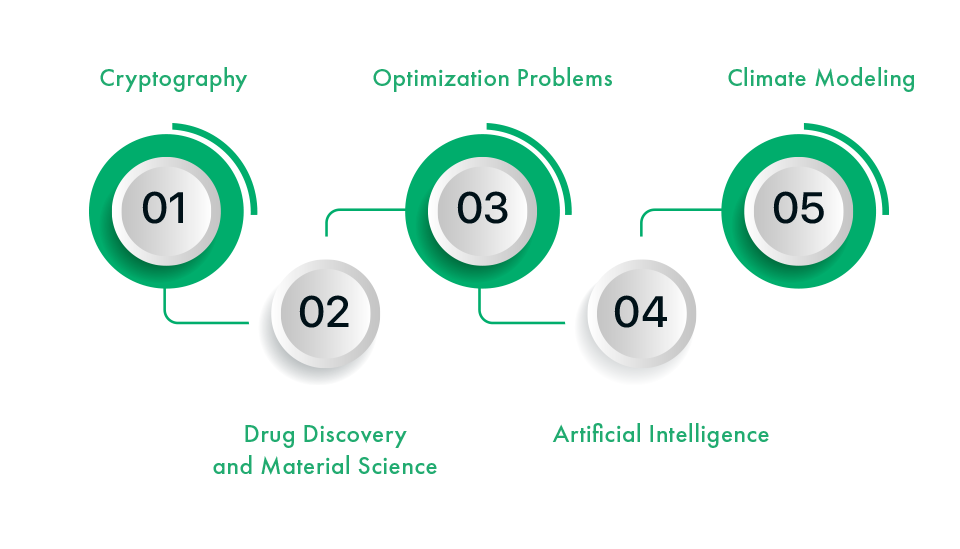Quantum computing research is progressing at a rapid pace, with vendors and researchers making rapid progress in building out full-stack quantum computers. The platforms stand to outcompete classical machines in solving business issues. As the technology continues to mature, quantum computing could unlock solutions for issues beyond classical machines, presenting new opportunities for industries.
Quantum computing is already promising great things in such applications as quantum processors for quantum annealing, an approach to solving advanced optimization challenges. Researchers are also working on creating quantum-inspired algorithms to advance business computation operations. Furthermore, there is increased emphasis on quantum-safe security to shield against potential quantum attacks, as much remains challenging.
Suppose quantum computers rapidly resolve issues that would take the world’s supercomputers years. With its capability to transform the healthcare, AI, and cybersecurity industries, the future is going to be revolutionized by quantum computing. What is quantum computing, and how is it going to change the world? Let’s find out.
Curious about quantum computing? Let’s talk AI solutions!
What is Quantum Computing?
Before getting on to the topic of impacts and what quantum computing’s future holds, it is necessary to understand what quantum computing is. Quantum computers use qubits instead of bits (0 and 1). This idea makes it possible for quantum computers to handle huge amounts of data at once, giving them truly unimaginable computing power.
Key Concepts of Quantum Computing
Quantum computing relies on principles that are very different from traditional computing. These principles, superposition, entanglement, and interference, are the reasons quantum computers have such great capabilities. Learning about these principles will be what enables one to understand why quantum computing has such vast potential to solve issues classical systems cannot.
1. Quantum Superposition
Quantum systems can be in multiple states at one single time and this phenomenon is known as quantum superposition. For example, a qubit can be 0 and 1 simultaneously.
2. Entanglement
Even if qubits are far apart, their states instantly impact each other. This entanglement property allows qubits to interact in complicated ways, helping Quantum Computers perform complex task.
3. Quantum Interference
This principle is used to amplify the probabilities of correct answers and cancel out the incorrect ones, making quantum algorithms potentially more powerful than classical ones.
How Does Quantum Computing Work?
Conventional computers employ bits, which are like switches that can only be either 1 or 0. The binary system is very useful in many cases, but its drawback appears when facing complex problems. Quantum computers work differently from routine computers. They employ qubits, that can be in any state of 1, 0, or both at the same time.
Consider an example of a coin that can be heads, tails, or both. That is how a qubit works. The superposition concept lets a single qubit explore many possibilities at one single time. It’s like having a bunch of regular bits working together at a very high speed.
Entangled qubits are linked together. What happens to one qubit instantly affects the other, no matter how far apart they are. This whole process seems quite impossible but once achieved it can help solve complex problems within no time. Due to this capability, they are well suited for solving problems that would take classical computers years to solve.
Quantum computers are still in their early stages, though. It’s hard to keep qubits in their tiny quantum states, and it’s hard to control them to do calculations. But the potential it holds is undeniable. quantum computing can change many areas in ways that will lead to new scientific discoveries.
Types of Quantum Computing
Currently, several distinct methods are being explored for developing and building quantum computers. The companies mentioned here are just examples and by no means a comprehensive list. As quantum computing continues to evolve, the leading approaches for qubit design and implementation include the following five key types:
SUPERCONDUCTING
Among qubit computing technologies, quantum computers made from superconducting materials are the most famous. They utilize tiny electrical circuits to generate and manipulate qubits. Google and IBM are particularly focused on advancing this technology. Superconducting computers excel in performing gate operations at high speed.
NEUTRAL ATOMS
Quantum computing with neutral atoms involves suspending individual atoms in an ultrahigh vacuum using arrays of tightly focused laser beams known as optical tweezers. These optical tweezers precisely control the position of the atoms, allowing for manipulation and interaction. While not all companies in the field of neutral atom quantum computing utilize optical tweezers, they are a key technology in this approach. One notable advantage of neutral atom quantum computers is their reduced sensitivity to external electric fields compared to other quantum computing methods. This makes them an attractive option for constructing reliable and stable quantum processors.
PHOTONIC
Many companies are working day and night for this photonic computing technology. In these types of computers, photons are used to perform and process quantum information which increases its complexity. However, when it comes to building really big quantum computers, using photonic qubits is a promising option. This is because they offer advantages over other methods like neutral atoms and superconducting, which need special cooling techniques like cryogenics or lasers to work properly.
TRAPPED IONS
A trapped ion quantum computer uses charged atoms or molecules (ions) that are captured and controlled via electric and magnetic fields to store and process quantum data. These ions, isolated from external factors, are perfect for precise measurements and other high-control applications. Their qubits stay in superposition for extended periods before decohering. Companies like Quantinuum, IonQ, and others lead this field in advancing trapped ion technologies.
QUANTUM DOTS
A quantum dot quantum computer employs silicon qubits made of coupled quantum dots. These ‘coupled’ quantum dots are proposed to act as stable quantum bits (qubits) in quantum computing. This method may possibly increase the stability and scalability of qubits so that they become more suitable to construct scalable, fault-tolerant quantum systems.
The Future Impact of Quantum Computing
It is well-known that quantum computers have not yet accomplished all that humans have theoretically envisioned as they are still in the early stages of development. But based on the findings of researchers, we have put together a list of the most valuable future impacts of quantum computing.

Cryptography:
Quantum computers have a potential threat to widely used encryption methods such as RSA and ECC, which can easily be broken through quantum technology. This threat has given rise to the development of quantum-resistant cryptographic algorithms. Whose aim is to make sure that our data remains safe in the future.
Drug Discovery and Material Science:
Quantum computers can very accurately model how molecules and atoms interact with each other, which could lead to big steps toward discoveries in material sciences and drugs. They are better and faster than regular computers. With their unique computational power, we can accelerate the process of developing drugs for uncurable diseases.
Optimization Problems:
As the global population continues to rise many real-world problems from logistics to financial modeling, need optimization. Quantum computers can explore many possible solutions at one single time. Which can provide us with optimal and efficient solutions that are faster than classical approaches.
Artificial Intelligence:
Quantum computing could be a game changer for machine learning and artificial intelligence. Through its computational power, many more efficient algorithms for data processing and pattern recognition can be developed. This can lead to further advancements in the field of AI. Helping us to create more advanced chatbots, autonomous vehicles, and much more.
Impact of Quantum Computing On Various Industries
Quantum computing is set to significantly impact industries such as healthcare, finance, education, and the environment. Its ability to process vast amounts of data will enhance drug discovery, revolutionize healthcare, improve educational methods, and address environmental challenges through optimized solutions, driving global progress.

Quantum Computing and Economic Implications
Quantum computers can help the economy a lot by facilitating the emergence of new industries and transforming existing ones. Companies utilizing this technology can gain a competitive advantage, offering faster problem-solving and innovative solutions to their customers. This technological advancement can bring economic progress and prosperity.
Quantum computing will create new job opportunities in research, development, and applications, increasing demand in fields like quantum software development, quantum algorithm design, and quantum hardware engineering. Additionally, Many large corporations are investing huge funds in quantum technology-based startups.
Quantum Computing and Education
Many breakthroughs in education are expected to be made possible by the implementation of the quantum computing system. New fields of study and research will be created. Education and other research institutions are already planning to create quantum computing courses and training programs. They plan to prepare more IT professionals, researchers, and software developers. Not only this but students and researchers will have the chance to work on new technologies and contribute to groundbreaking discoveries. Which will help us advance and understand various scientific domains.
Quantum Computing and the Environment
Quantum computing could also help solve some of the world’s most important environmental problems. From facilitating efficient industrial operations to reducing power consumption costs, quantum computers have the potential to provide an effective solution for all. In addition, they can help make sustainable technologies better by making it possible to find new materials and chemicals that make solar cells and batteries work better. Quantum computers can also do advanced climate models and simulations that can help people come up with good plans to stop and adapt to climate change. These computers are very useful for fighting the environmental problems our world is facing.
Quantum Computing and Healthcare
With much more powerful computers than the classical ones, we are likely to see many new medical diagnoses. Doctors can diagnose the disease faster and can discover new medicines for many uncurable diseases. Patients can also be treated much more rapidly.
Pros and Cons of Quantum Computing
| Pros | Cons |
|---|---|
| Quantum computers can solve complex problems much faster than classical computers. | Building and maintaining quantum computers is very expensive due to specialized equipment and environments. |
| They can optimize problems in logistics, supply chains, and financial models. | Quantum computers are still in early development, and access to them is limited. |
| Quantum computing can accelerate drug discovery and genomics research. | Quantum systems are highly sensitive to external noise, causing errors in calculations. |
| Ability to analyze vast datasets quickly and with higher precision. | Qubits are prone to losing their quantum state, making it difficult to maintain calculations. |
| Quantum computing can enhance AI models for pattern recognition and decision-making. | Quantum computing requires a specialized workforce, which is currently in short supply. |
Want a smart mobile app? Let’s bring AI to your idea!
Conclusion
While the journey from theory to practical application is challenging, the benefits of qubits computers are uncountable. From breaking current cryptographic codes to discovering new medicine and materials, optimizing work for many industries, and tackling climate change, the impact of quantum computing will be groundbreaking.
The future and impact of quantum computing is promising. With current research and huge investments, it is crucial to address the ethical, societal, and technical threats that come with it. Therefore preparation for those challenges is necessary to make sure there are no threats to the privacy of users.
Read our more tech blogs to stay updated on the latest trends in IT, cloud computing and software development!
FAQs
Quantum computing leverages quantum mechanics to process information in ways classical computers cannot. Using qubits, which can exist in multiple states simultaneously, quantum computers promise faster solutions for complex problems, like cryptography, optimization, and drug discovery.
Quantum computers could break current encryption methods (like RSA) in the next 10-20 years, once they achieve sufficient power. This could compromise data security, prompting research into quantum-resistant encryption algorithms to safeguard digital communication and sensitive data in the future.
The main threat is quantum computing’s potential to break encryption algorithms that protect sensitive data. Quantum computers can solve certain problems, such as factoring large numbers, much faster than classical computers, jeopardizing digital security in banking, communication, and personal data protection.
Quantum computers are still in the early stages of development, and it could take another 10-20 years before they are viable for practical use. Challenges like error correction, stability, and scalability need to be overcome. However, advancements are steadily moving quantum computing toward commercial application.
Leading companies in quantum computing include IBM, Google, and Microsoft. IBM offers a cloud-based quantum computing platform, while Google achieved “quantum supremacy” in 2019. Other key players, such as IonQ and Honeywell, are also advancing the field with new technologies.


